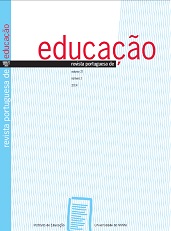Digital Technologies in School Administration: Practice, Proficiency and Training needs of School Principals in Portugal
DOI:
https://doi.org/10.21814/rpe.6254Abstract
This paper presents the results of a study organized according to the post positivist research paradigm and is assumed a descriptive study involving 133 participants (16%) of a universe of 831 principals of the Portuguese public schools. This study aims to analyze the practices and proficiency levels indigital technology (DT) use presented by the Portuguese school principals.Data collection process was based on the application of two online self-report scales: ‘Computer self-efficacy scale’ and the ‘DT use in scholar administration practices scale’, in the school year of 2012-2013. The results show favorable scores both in DT proficiency level and in the use of digital technologies in professional practices. Therefore schools principals reported favorable personal attitudes towards the use of DT in their own professional activities.The study also explores the principals’ training needs in the area of digital technologies and even though the levels of DT use in professional practices are positive, principals pointed out significant needs regarding ICT training.
Keywords: ICT in education; School principals; Self-efficacy in DT use; DT use in schooladministration
Downloads
Downloads
How to Cite
Issue
Section
License
1. The authors preserve their authorship and grant the Portuguese Journal of Education the right to the first publication. The work is licensed under Creative Commons Attribution License that allows sharing the work with the acknowledgment of initial authorship and publication in this Journal.
2. The authors have the right to take additional contracts separately, for non-exclusive distribution of the published version of their work (e.g. to deposit in an institutional repository or as a book chapter), acknowledging the initial authorship and publication in this Journal.
3. The authors have the permission and are stimulated to post their work online (e.g. in an institutional repository or on their personal website). They can do this at any phase of the editorial process, as it may generate productive changes, as well as increase impact and article citation (see The Open Citation Project).
The work is licensed under Attribution-ShareAlike 4.0 International (CC BY-SA 4.0)




















